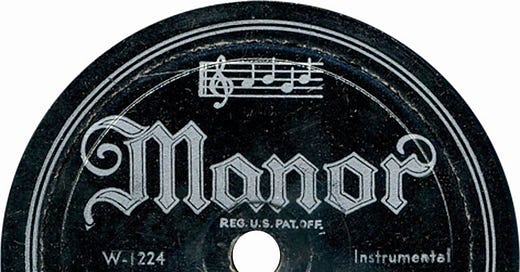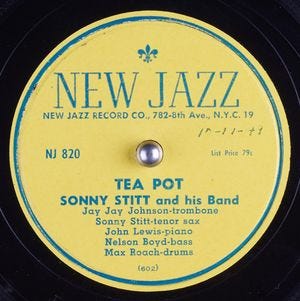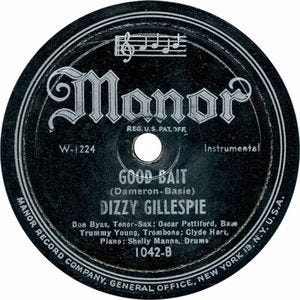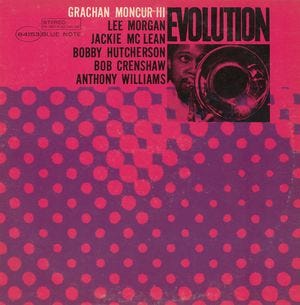Some Jazz Records: Grachan Moncur III Clippings
Comments on recordings from musicians and other actors of the jazz scene. Random and not-so-random listening cues from the archives.
Sonny Stitt and His Band, Afternoon in Paris/Tea Pot, New Jazz NJ 820, ca. 1949, 10" 78 rpm.
In an interview with bassist William Parker included in his important series of Conversations books (and also published online by Point of Departure), Grachan Moncur III discussed childhood friends who had all the newest bebop records in the late 1940s. "I was playing trombone. They asked me who was my favorite cat at the time, and I told them, Benny Green. He said, 'Look, I want you to take this record here and go back into the room and listen to this record.' It was by J. J. [Johnson] and one of the pieces on there was called 'Teapot.' He said, 'Just sit down and listen to this. And when you come out I’ll ask you a question.' So I did that and when I came out, he says, 'Now who’s your favorite trombonist?' I said, 'J. J., man.' [laughs] I was still in grade school." According to Tom Lord’s Jazz Discography, Johnson had by then recorded his "Teapot" original only once, during an October 17, 1949 session with Sonny Stitt, John Lewis, Nelson Boyd and Max Roach. The recording was originally released on the flip side of a New Jazz 78 rpm record.
Dizzy Gillespie, I Can’t Get Started/Good Bait, Manor 1042, 1946, 10" 78 rpm.
Grachan Moncur III attended the Laurinburg Institute, a North California preparatory school. "I often tell the story of when I first came to the campus," he told Fred Jung. "It was around lunchtime and all the kids were out on the campus and when they saw the car coming up, they knew it was somebody new coming to the school, so when we stopped in front of the dormitory, I took my trunk out of the car and then I took my trombone out and one of the kids that was standing around said, 'Oh, man, we got a trombone player,' and that sounded good to me. Nobody had called me a trombone player before. Right away, they wanted me to take out my horn and play something for them and I had never really tried to play anything except what I had been experimenting with, but I did remember these two bars that I remembered from a record that Dizzy had made with Trummy Young on trombone and I did remember the first two bars of Trummy Young’s solo and so that is all I played. I took out my horn and started playing these two bars over and over and then kids started clapping with me. That was it. I caught the bug." Gillespie, who had himself attended Laurinburg in the 1930s, shared several recording sessions with Young (see, for example, the 1945 CD in the Classics Chronological Series). But the recording Moncur is referring to is probably "Good Bait," cut on January 9, 1945, during Gillespie’s first session under his own name, as the track contains a substantial trombone solo.
Grachan Moncur III, Evolution, Blue Note BLP 4153 (BST 84153), 1964, LP.
Grachan Moncur III made his first major recordings as a key member of Jackie McLean's band, in 1963. That year, they cut One Step Beyond and Destination Out for Blue Note. "When my father heard Destination Out he said 'Wow! I always knew I had some weird music in me and seems like you did it for me!,'" Moncur told Valerie Wilmer in an interview published by Jazz Monthly in 1965. Two months after this session, Moncur taped his leader debut, Evolution. "That really did it for my father. I phoned my mother and she told that for two months he wouldn’t leave the house without the record under his arm!" Moncur’s father, who was mostly known as "Brother" Moncur, was himself a professional musician. He played bass, notably with the Savoy Sultans and with Billie Holiday, but also doubled on trombone and tuba. "I never listened to any trombone player other than J. J. so it’s funny if I don’t sound like him," his son told Wilmer before acknowledging a possible even if elusive degree of continuity. "The only other trombonist I heard was my father and I’ve never heard a sound like it. He didn’t play solos because bass was his thing, but he’d play a couple of Duke Ellington melodies and get the hippest sound. Recently I’ve started to get that sound as I warm up sometimes, but I can’t be positive that he was any influence."






